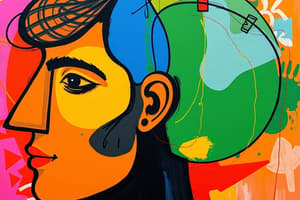Podcast
Questions and Answers
What doctrine asserts that man is composed of both matter and form?
What doctrine asserts that man is composed of both matter and form?
- Tabula Rasa
- Aristotelian Metaphysics (correct)
- Dualism
- Bundle Theory
Which philosopher is known for the phrase 'I think, therefore I am'?
Which philosopher is known for the phrase 'I think, therefore I am'?
- John Locke
- David Hume
- Sigmund Freud
- René Descartes (correct)
What concept does John Locke use to explain identity?
What concept does John Locke use to explain identity?
- The division of the mind and body
- The dominance of Eros and Thanatos
- The memory connection across life stages (correct)
- The bundle of impressions
David Hume's Bundle Theory relates to which of the following?
David Hume's Bundle Theory relates to which of the following?
Which of Freudian concepts represent the driving forces behind human behavior?
Which of Freudian concepts represent the driving forces behind human behavior?
What is a key characteristic of a social group?
What is a key characteristic of a social group?
What does Gilbert Ryle deny regarding the self?
What does Gilbert Ryle deny regarding the self?
Which aspect of the self is described as how a person perceives themselves?
Which aspect of the self is described as how a person perceives themselves?
What does the term 'identity toolbox' refer to?
What does the term 'identity toolbox' refer to?
Kapwa in Filipino psychology is based on which of the following concepts?
Kapwa in Filipino psychology is based on which of the following concepts?
How has modernization influenced the development of self-identity according to the content?
How has modernization influenced the development of self-identity according to the content?
Which of the following best describes a sociocentric perspective?
Which of the following best describes a sociocentric perspective?
In Mead's model of self-development, which stage involves understanding societal rules?
In Mead's model of self-development, which stage involves understanding societal rules?
What primarily influences the development of the self according to the anthropological perspective?
What primarily influences the development of the self according to the anthropological perspective?
Which of the following characteristics is considered almost universal in shaping social identity?
Which of the following characteristics is considered almost universal in shaping social identity?
What does egocentricity imply about Americans' view of self?
What does egocentricity imply about Americans' view of self?
What is the purpose of personal naming in relation to social identity?
What is the purpose of personal naming in relation to social identity?
Which phase of the rite of passage involves detaching from a former identity?
Which phase of the rite of passage involves detaching from a former identity?
What aspect of human behavior does psychology primarily focus on?
What aspect of human behavior does psychology primarily focus on?
What is the role of schemas in Piaget's theory of cognitive development?
What is the role of schemas in Piaget's theory of cognitive development?
Which of the following is NOT one of the four goals of psychology?
Which of the following is NOT one of the four goals of psychology?
Which phase of the rite of passage is characterized by the actual transition to a new identity?
Which phase of the rite of passage is characterized by the actual transition to a new identity?
What aspect of cognitive development is primarily concerned with how a child adapts to their environment?
What aspect of cognitive development is primarily concerned with how a child adapts to their environment?
Which statement best reflects the relationship between the self and society according to sociological perspectives?
Which statement best reflects the relationship between the self and society according to sociological perspectives?
What does functional autonomy imply about human motives?
What does functional autonomy imply about human motives?
At what stage does the libido become inactive according to Freud's psychosexual stages?
At what stage does the libido become inactive according to Freud's psychosexual stages?
What characterizes the Child Ego state according to Eric Berne?
What characterizes the Child Ego state according to Eric Berne?
Which aspect is associated with being agentic, as described by Albert Bandura?
Which aspect is associated with being agentic, as described by Albert Bandura?
What defines the unhealthy false self according to Winnicott?
What defines the unhealthy false self according to Winnicott?
Which statement best describes Western thoughts regarding the self?
Which statement best describes Western thoughts regarding the self?
What is a key focus of Eastern thoughts on the self?
What is a key focus of Eastern thoughts on the self?
How do traits manifest according to the definition given?
How do traits manifest according to the definition given?
What does the term 'Annica' in Buddhism refer to?
What does the term 'Annica' in Buddhism refer to?
In Hinduism, what is the Law of Karma primarily associated with?
In Hinduism, what is the Law of Karma primarily associated with?
Which of the following does NOT represent one of the four beginnings of the self in Confucianism?
Which of the following does NOT represent one of the four beginnings of the self in Confucianism?
According to Taoism, how should one live their life for balance and harmony?
According to Taoism, how should one live their life for balance and harmony?
What concept in Confucianism emphasizes the importance of self-cultivation?
What concept in Confucianism emphasizes the importance of self-cultivation?
What does Buddhism state about the concept of 'self'?
What does Buddhism state about the concept of 'self'?
Which statement correctly reflects the Eastern theories discussed in the content?
Which statement correctly reflects the Eastern theories discussed in the content?
What is the ultimate goal for Atman in Hinduism?
What is the ultimate goal for Atman in Hinduism?
Flashcards are hidden until you start studying
Study Notes
Philosophers on the Self
- Thomas Aquinas proposed that man consists of both matter (hyle) and form (morpe), defining form as the essence of life.
- René Descartes introduced the phrase "I think, therefore I am," and is recognized as the Father of Modern Philosophy, questioning the physical body’s existence through hyperbolical doubt.
- John Locke's view on identity emphasizes memory alongside mind and body, stating that identity evolves through psychological connections across life stages, introducing the concept of Tabula Rasa (blank slate).
- David Hume argued that "All knowledge is derived from human senses," contributing to empiricism; he proposed the Bundle Theory, where the self is a collection of impressions and ideas defined by experience.
- Sigmund Freud highlighted that the ego is not the master of the house, identifying drives of Eros (life) and Thanatos (death), and categorizing the mind into Id, Ego, and Superego.
- Gilbert Ryle rejected the notion of a non-physical self, suggesting that the self is merely a reference to behavior.
- Merleau-Ponty also dismissed dualism, asserting that mind and body are inseparable.
Filipino Psychology and Kapwa
- Kapwa is a core value in Filipino psychology, categorized into two types: Ibang Tao (those who pass by) and Hindi Ibang Tao (close individuals).
- Modern society significantly influences individual self-construction, fostering interconnectedness between self and community.
- Key Filipino values include Hiya (social propriety), Utang na loob (debt of gratitude), Pakiramdam (empathy), Pakikisama (social harmony), Kagandahang-loob (kindness), and Kapwa (collective identity).
- Characteristics of modernity involve industrialism, capitalism, institutions of surveillance, and dynamism.
Social Groups and the Individual
- A social group consists of two or more individuals sharing characteristics, while a social network reflects connections within groups.
- Organic groups arise naturally through family ties, while rational groups form based on shared interests.
- Self-development viewed through Mead’s stages includes language, play, and game, highlighting the interplay of self-perception ("I") and public perception ("Me").
Anthropological Perspectives on Self
- Anthropology takes a holistic view of human nature, focusing on interactions between cultural and biological factors shaping the self.
- Egocentric individuals (e.g., Americans) act independently, whereas sociocentric individuals depend on social contexts.
- Identity is shaped through kinship, family, and sociocultural influences, with language and religion serving as significant markers.
- Identity changes are marked by rites of passage: separation, liminality, and incorporation phases reflect transitions in status.
The Self in Sociology and Psychology
- Theodor Adorno noted that the self’s existence is intertwined with society.
- Psychology examines human behavior and mental processes, focusing on individual stages of development, consciousness, and social influence.
- Four goals of psychology aim to describe, explain, predict, and modify behaviors.
- Jean Piaget’s cognitive development theory includes concepts like schema (knowledge organization) and adaptation (meeting situational demands).
- Gordon Allport discussed functional autonomy in motives and the significance of traits as enduring characteristics.
Freudian and Ego States
- Freud outlined psychosexual development stages: oral, anal, phallic, latent, and genital, each associated with particular erogenous zones.
- Eric Berne identified three ego states in personality: Parent (authority), Adult (rational), and Child (spontaneous).
The Proactive Self - Albert Bandura
- Bandura emphasized a proactive self capable of initiating actions and agentic belief, involving self-reflectiveness towards one's life direction.
True vs. False Self - Winnicott
- The False Self emerges from inadequate parenting, aligning behavior with external expectations, while the True Self flourishes under responsive care, representing creativity and authenticity.
Western vs. Eastern Thoughts on Self
- Western thought uses scientific methods to study the self, focusing on individualistic perspectives.
- Eastern thought addresses the meaning of life, emphasizing relational identity and practical aspects of existence.
- Buddhism teaches the concept of no self, emphasizing impermanence (Annica) and a life without fixed identity.
- Hinduism prioritizes knowledge of true reality (Brahman) and the law of karma, illustrating the cycles of rebirth and the pursuit of Nirvana.
- Confucianism promotes self-realization through moral character and societal roles, centered on the Principle of Reciprocity.
- Taoism advocates for selflessness and harmony with nature, valuing simplicity and balance between opposing elements (Yin and Yang).
Studying That Suits You
Use AI to generate personalized quizzes and flashcards to suit your learning preferences.




